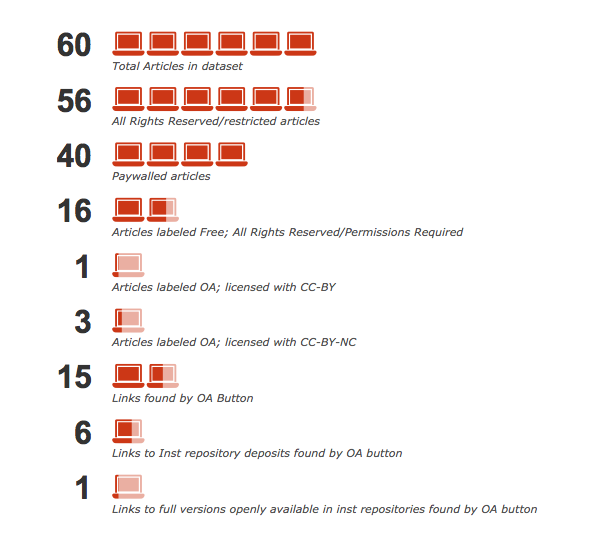I used The Altmetric Explorer to locate any articles from the Journal of Digital Scholarlship in the Humanities that had had any ‘mentions’ online anytime. An original dataset of 82 bibliographic entries was obtained. With the help of Joe McArthur the Open Access Button API was then employed to detect if any of the journal articles in the dataset had open access surrogates (for example, self-archived versions in institutional repositories) and if so, which content they actually provided access to. The API located 24 URLs of the 82 DOIs corresponding to each article in the dataset.
I then edited and refined the original dataset to include only the top 60 results. Each result was manually refined and cross-checked to verify the resulting links matched the correct outputs and to what kind of content they provided access to, as well as to identify the type of license and type of access of each article’s version of record.
…
Back in 2014, we suggested that “altmetrics services like the Altmetric Explorer can be an efficient method to obtain bibliographic datasets and track scholarly outputs being mentioned online in the sources curated by these services” (Priego et al 2014). That time we used the Explorer to analyse a report obtained by searching for the term ‘digital humanities’ in the titles of outputs mentioned anytime at the time of our query.
It’s been three years since I personally presented that poster at DH2014 in Lausanne, but the topic of publishing pracitices within the digital humanities keeps being of great interest to me. It could be thought of as extreme academic navel-gazing, this business of deciding to look into bibliometric indicators and metadata of scholarly publications. For the digital humanities, however, questions of scholarly communications are questions of methodology, as the technologies and practices required for conducting research and teaching are closely related to the technologies and practices required to make the ‘results’ of teaching and research available. For DH insiders, this is closely connected to the good ol’ less-yacking-more-hacking, or rather, no yacking without hacking. Today, scholarly publishing is all about technological infrastructure, or at least about an ever-growing awareness of the challenges and opportunities of ‘hacking’ the modes of scholarly production.
Read the full post here.
